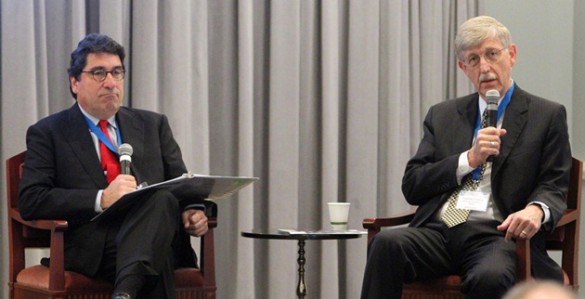
Science is on the verge of any number of breakthroughs just as it faces massive cutbacks in federal money because of the federal budget deficit, Chancellor Nicholas S. Zeppos told attendees of the Global South Summit.
“We’re really at an inflection point,” Zeppos said during his introduction of Francis Collins, director of the National Institutes of Health, on Nov. 14. “Supporting young people in discovery and the jobs that come from it is really what made this nation great.
“[rquote]The American dream runs down two streets, and it’s Main Street and University Avenue. If you can bring those together and build on that, I think you’ll continue to see great things ahead for Nashville and our nation.”[/rquote]
The first Global South Summit was held at the Schermerhorn Symphony Center and The Pinnacle at Symphony Place in Nashville. It convened leaders from around the world to define solutions that create abundance through innovation.
Collins said the worst-case scenario for the NIH if Congress and the president don’t act before automatic tax increases and spending cuts take effect in January would be a loss of 8.2 percent of the NIH budget, or about $2.5 billion.
“That blow to young investigators is too horrendous to contemplate,” he said. “I don’t mean to sound gloomy, but this is a wake-up call.”
The loss would be an economic loss to America as well, Collins said.
“If you look at America’s economic success since World War II, it comes from science, technology and innovation,” he said, “and we have dominated the world for much of those 60 years.
“But we are no longer in a position to say that dominance is going to continue unchallenged. … Our investments here have been pretty much flat for many years now, while countries like China and India are coming up very fast.”
China alone has invested $305 billion in science and technology research over the past five years, Collins said.
“At NIH right now, we have the opportunity to make inroads to diseases like cancer and Alzheimer’s and diabetes,” he said. “We could develop a universal influenza vaccine in the next five years … and we have opportunities to do something about our nationwide epidemic of obesity.”
Zeppos said he felt optimistic about the future, despite the challenges out of Washington that research universities face.
“You can’t be pessimistic on a college campus,” Zeppos said. “It’s just impossible. There’s an 18-year-old student there, and that student is going to cure cancer or invent something that’s going to clean the carbon out of the air.”